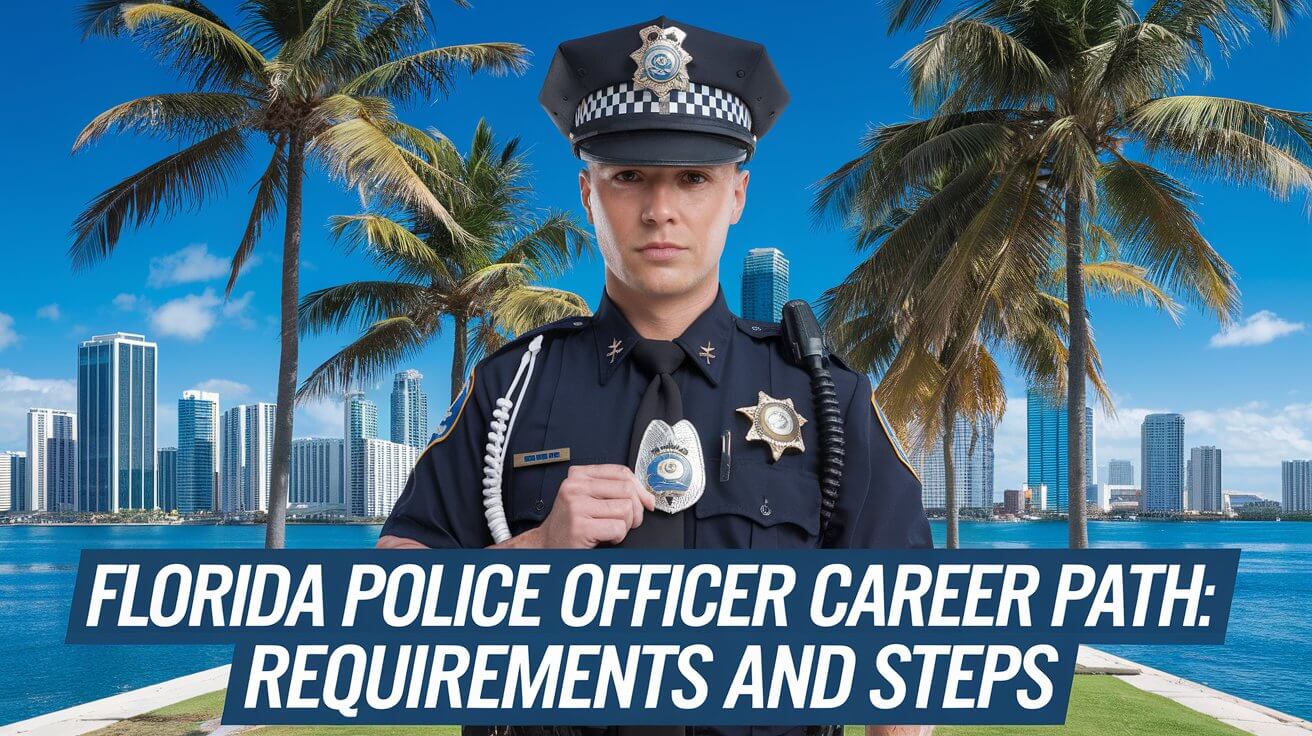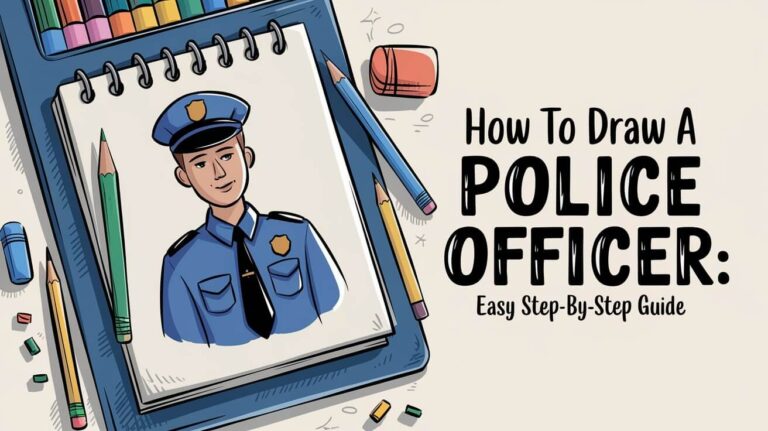Florida Police Officer Career Path: Requirements and Steps

To become a police officer in Florida, you need to be at least 19 years old, a U.S. citizen, have a high school diploma or GED, pass a basic abilities test, complete police academy training, and pass the state certification exam. This guide covers every step of the process, from meeting initial requirements to landing your first job in law enforcement.
Florida’s sunny beaches and vibrant cities need dedicated officers to keep communities safe. If you’re looking for a challenging and rewarding career in law enforcement, the Sunshine State offers excellent opportunities. Let’s explore the path to becoming a Florida police officer.
Florida Police Officer Requirements
Age and Citizenship
Florida law sets clear standards for aspiring police officers. You must be at least 19 years old to apply. This age requirement ensures candidates have some life experience before taking on the responsibilities of law enforcement.
U.S. citizenship is mandatory. Florida doesn’t accept applications from non-citizens, even if they’re permanent residents. This rule stems from the sensitive nature of police work and access to confidential information.
Education
A high school diploma or GED is the minimum educational requirement to become a police officer in Florida. While this baseline opens the door to many candidates, some departments prefer applicants with college degrees.
Having an associate’s or bachelor’s degree in criminal justice, law enforcement, or a related field can give you an edge in the hiring process. It may also lead to higher starting pay and faster promotion opportunities down the road.
Criminal History and Background
A clean criminal record is crucial for aspiring Florida police officers. Felony convictions or misdemeanors involving perjury or false statements will disqualify you from service. Even minor offenses can raise red flags during the background check process.
Departments also look at your driving record, credit history, and past employment. They want officers with good judgment and integrity. A history of responsible behavior strengthens your application.
Steps to Become a Florida Police Officer
Complete Basic Abilities Test (BAT)
The first hurdle in your journey to become a Florida police officer is the Basic Abilities Test (BAT). This exam measures essential skills for law enforcement work, including:
- Written comprehension
- Problem-solving
- Memorization
- Situational judgment
You’ll have 90 minutes to complete 97 multiple-choice questions. A score of 70% or higher is required to pass. Study guides and practice tests are available to help you prepare.
Some candidates are exempt from taking the BAT. If you’re a military veteran or have an associate’s degree or higher, you can skip this step. This exemption recognizes the skills and discipline gained through military service and higher education.
Attend a Police Academy
After passing the BAT, your next step is completing a Florida police academy program. These academies provide comprehensive training in law enforcement skills and knowledge. The standard program takes about 770 hours, typically spread over 19 weeks of full-time study.
Academy curriculum covers topics like:
- Florida criminal and traffic laws
- Firearms training
- Emergency vehicle operations
- First aid and CPR
- Defensive tactics
- Crime scene investigation
The training is physically and mentally demanding. You’ll need to stay in good shape and study hard to succeed. Many cadets find the experience challenging but rewarding as they develop the skills to protect and serve their communities.
Pass the State Officer Certification Examination (SOCE)
After completing academy training, you’ll need to pass the State Officer Certification Examination (SOCE). This test evaluates your knowledge of Florida law enforcement practices and procedures. You have three attempts to pass the exam. If you don’t succeed after three tries, you’ll need to retake the academy program.
The SOCE covers material from your academy training, including:
- Legal issues
- Patrol procedures
- Traffic enforcement
- Investigations
- Use of force guidelines
Thorough review of your academy materials is key to success on this exam. Many candidates find study groups helpful for preparing.
The Application Process
Preparing Your Application
With your BAT score, academy certificate, and SOCE results in hand, you’re ready to apply to Florida police departments. Each agency has its own application process, but common requirements include:
- Detailed personal history statement
- Copies of vital records (birth certificate, driver’s license, etc.)
- Education transcripts
- Military service records (if applicable)
- List of references
Take time to fill out your application carefully and accurately. Any inconsistencies or omissions can delay your processing or even disqualify you.
Physical Fitness Requirements
Florida police departments want officers who can handle the physical demands of the job. Most agencies require candidates to pass a physical abilities test as part of the hiring process. Common elements include:
- 1.5-mile run
- Push-ups
- Sit-ups
- Obstacle course
- Dummy drag
Start training well before your test date. Many departments post their fitness standards online, so you’ll know exactly what to prepare for.
Background Investigation
Expect a thorough background check as part of your application. Investigators will verify your employment history, education, and personal references. They’ll also review your driving record, credit report, and any police contacts.
Be honest about your past. It’s better to disclose minor issues upfront than have investigators discover them later. Many departments are willing to overlook youthful mistakes if you’ve shown personal growth and responsibility since then.
Training and Academy Life
What to Expect in Police Academy
Police academy life is intense and structured. You’ll typically live on-campus during training, with early mornings and long days filled with classes, physical training, and practical exercises. The experience builds camaraderie among recruits while instilling discipline and professionalism.
Key aspects of academy training include:
- Classroom instruction on laws and procedures
- Firearms qualification
- Emergency vehicle operation
- Defensive tactics and use of force scenarios
- Report writing and documentation skills
Instructors push recruits hard, simulating the stress of real police work. The goal is to produce officers who can think clearly and act decisively under pressure.
Field Training Program
After graduating from the academy, newly hired officers enter a field training program. You’ll work alongside experienced officers, applying your academy knowledge to real-world situations. This on-the-job training typically lasts 12-16 weeks.
Field training officers (FTOs) evaluate your performance daily. They’ll coach you on department procedures and help you develop good judgment in handling various calls for service. Successfully completing field training is the final step to becoming a fully certified Florida police officer.
Specialized Roles in Florida Law Enforcement
State Troopers
The Florida Highway Patrol (FHP) focuses on traffic enforcement and crash investigation on state highways. Troopers receive additional training in commercial vehicle regulations and advanced crash reconstruction techniques. The FHP also provides security for the state capitol and protection for the governor.
Sheriff’s Deputies
Each of Florida’s 67 counties has an elected sheriff responsible for law enforcement in unincorporated areas. Deputies often have a wider range of duties than city police officers, including operating county jails and providing courthouse security. Rural sheriff’s offices may cover large geographic areas, requiring deputies to be self-reliant problem-solvers.
City Police Officers
Municipal police departments serve Florida’s cities and towns. The job duties can vary widely depending on the size and nature of the community. Officers in tourist areas like Orlando or Miami Beach face different challenges than those in small agricultural towns. Many city departments offer opportunities to specialize in areas like K-9 units, SWAT teams, or community outreach programs.
Career Advancement and Continuing Education
Promotion Opportunities
Florida law enforcement agencies typically offer clear career paths for officers. Common ranks include:
- Corporal
- Sergeant
- Lieutenant
- Captain
- Major
- Deputy Chief/Assistant Chief
- Chief of Police/Sheriff
Advancement often requires a combination of years of service, additional training, and competitive testing. Many upper-level positions prefer or require college degrees.
Required Ongoing Training
To maintain their certification, Florida police officers must complete 40 hours of continuing education every four years. This training covers topics like:
- Legal updates
- Firearms qualification
- Use of force policies
- Crisis intervention
- Cultural diversity
Many agencies offer additional specialized training opportunities. Taking advantage of these can boost your skills and make you more competitive for promotions.
Salary and Benefits for Florida Police Officers
Entry-Level Salaries
Starting salaries for Florida police officers vary by agency and location. As of 2024, entry-level pay typically ranges from $45,000 to $55,000 per year. Larger departments in urban areas tend to offer higher starting salaries to attract qualified candidates.
Experienced Officer Pay Scales
With experience and promotions, Florida police officer salaries can increase significantly. After 5-10 years of service, many officers earn $60,000 to $80,000 annually. Supervisors and command staff can make well over $100,000 per year in larger agencies.
Benefits Package
Florida law enforcement agencies generally offer comprehensive benefits packages, including:
- Health, dental, and vision insurance
- Life insurance
- Retirement plans (often with earlier retirement eligibility than civilian jobs)
- Paid vacation and sick leave
- Tuition reimbursement for job-related education
Many departments also provide take-home patrol vehicles and uniform allowances.
Challenges and Rewards of Being a Florida Police Officer
Job Demands and Stress
Policing is a high-stress occupation. Florida officers face:
- Unpredictable and sometimes dangerous situations
- Shift work that can disrupt family life
- Emotional toll of dealing with crime victims and traumatic scenes
- Public scrutiny and media attention
Departments increasingly recognize the importance of officer wellness programs. Many offer counseling services and stress management training to help officers cope with job-related pressures.
Community Impact and Job Satisfaction
Despite the challenges, many Florida police officers find their work deeply rewarding. They have the opportunity to:
- Help people in their most vulnerable moments
- Solve problems and make their communities safer
- Build positive relationships with the public
- Experience the camaraderie of a close-knit profession
For those called to serve and protect, few careers offer the same level of purpose and impact as law enforcement.
Resources for Aspiring Florida Police Officers
Florida Department of Law Enforcement
The FDLE website (www.fdle.state.fl.us) provides valuable information on becoming a police officer in Florida. You’ll find details on certification requirements, training programs, and job opportunities across the state.
Local Police Department Websites
Many Florida police departments have dedicated recruitment pages on their websites. These often include specific application instructions, physical fitness standards, and FAQ sections for prospective officers.
Frequently Asked Questions
How long does it take to become a police officer in Florida?
The process typically takes 6-12 months from starting academy training to being hired as a certified officer. This can vary depending on factors like agency hiring timelines and how quickly you complete each step of the process.
Can I transfer my out-of-state police certification to Florida?
Florida offers an equivalency of training process for certified officers from other states. You’ll need to demonstrate that your previous training meets Florida standards and pass the State Officer Certification Exam. Contact the FDLE for specific requirements.
What disqualifies you from being a police officer in Florida?
Automatic disqualifiers include felony convictions, certain misdemeanors involving moral turpitude or false statements, and dishonorable discharge from the military. Other factors like past drug use, poor credit history, or a pattern of traffic violations may also prevent hiring, depending on agency standards.
Becoming a Florida police officer demands dedication, hard work, and commitment to public service. Follow the steps in this guide and uphold high personal standards to join Florida’s finest and impact your community.




![Police Officer Work Hours: A Comprehensive Guide [2024] 5 Police Officer Work Hours](https://policepathfinder.com/wp-content/uploads/2024/10/police-officer-work-hours-768x431.jpeg)

